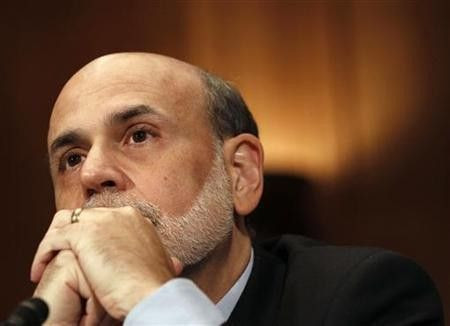Bernanke quiet on next Fed moves, stresses job crisis

Federal Reserve Chairman Ben Bernanke on Friday stopped short of detailing further action to boost the U.S. recovery but said the central bank would consider what more it could do to fight high unemployment, giving some comfort to investors.
Bernanke said the Fed had marked down its outlook for U.S. economic growth and said it would extend its September policy meeting to two days from one to consider its options. However, he also said the onus for boosting long-term growth prospects lay at the feet of the White House and the U.S. Congress.
It is clear the recovery from the crisis has been much less robust than we had hoped, he told an annual Fed conference here.
Under Bernanke's leadership, the U.S. central bank launched an unprecedented array of measures to steer the economy away from what could have been a second Great Depression.
A weak raft of data has led analysts to say chances of a new recession could range as high as 50 percent.
The economy grew at a paltry 1 percent annual rate in the second quarter, the government said on Friday, after growing only 0.4 percent in the first three months of the year. At the same time, Europe is strangled by a debt crisis that is undercutting the recovery there.
The growth fundamentals of the United States do not appear to have been permanently altered by the shocks of the past four years, Bernanke said. The economic healing will take a while, and there may be setbacks along the way, he added. However ... the healing process should not leave major scars.
His optimism carried a caveat. He said if policymakers failed to bring down the extraordinarily high level of U.S. long-term unemployment, jobs skills could atrophy, harming the economy's long-run potential.
He said investor concerns over Europe's debt and political fights on the U.S. budget had harmed growth prospects.
Financial stress has been and continues to be a significant drag on the recovery, both here and abroad, he said. It is difficult to judge by how much these developments have affected economic activity thus far, but there seems little doubt that they have hurt household and business confidence and that they pose ongoing risks to growth.
Julian Callow, an economist at Barclays Capital in London, said incoming economic data would determine if the Fed moves to provide further support for the sputtering recovery.
He was rather boxed in terms of what he could say, Callow said. The markets have been increasing pressure on him to say more, but he needs to take the FOMC with him.
Earlier this month, the Fed said it expected to hold overnight U.S. interest rates near zero for at least the next two years, a move that elicited a rare three dissents.
RECESSION WATCH
Some investors have begun to hope the central bank, which has already bought $2.3 trillion in bonds, would launch a fresh round of asset purchases, although many analysts think more modest steps, such as shifting the Fed's securities holdings into longer maturities, are more likely.
Bernanke simply reiterated language from the Fed's latest policy statement that the central bank was examining its options and was prepared to act as needed.
Monetary policy must be responsive to changes in the economy and, in particular, to the outlook for growth and inflation, he said. He repeated the Fed's view that easing commodity prices should bring inflation into line with the Fed's 2 percent or under goal.
A weak raft of economic data have led economists to say chances of a fresh U.S. recession could range as high as 50 percent.
The economy grew at a paltry 1 percent annual rate in the second quarter as consumer spending notched its smallest gain since the final three months of 2009, the government said on Friday. It grew only 0.4 percent in the first quarter.
At the same time, Europe is strangled by a debt crisis that is undercutting growth prospects there.
As gloomy news on the U.S. economy mounted in recent weeks, stock markets plunged and speculation grew the Fed would crank up its crisis-fighting operation. The yield on the 10-year Treasury note hit a new low.
In an interview with CNBC before Bernanke's remarks, Philadelphia Federal Reserve Bank President Charles Plosser said further bond purchases by the Fed would do the economy little good.
I'm not sure it would be beneficial to the problems that we are facing, Philadelphia Federal Reserve Bank President Charles Plosser told CNBC. Plosser, a noted inflation hawk, was one of the officials who dissented at the Fed's August 9 meeting.
A BALANCE SHEET FIX
Fed officials have discussed buying more longer-term debt and selling short-term securities, an operation that could increase downward pressures on long-term interest rates without further bloating the central bank's balance sheet.
Long-term Treasury yields are an important benchmark for home loans, and they could encourage home buying. In addition, a shifting in the Fed's portfolio could push some yield-hungry investors into other assets, such as stocks and corporate bonds, perhaps spurring stronger spending.
But some officials think an effort to twist down the longer end of the interest rate curve might do little good.
A twist operation would not have every much effect. It's been analyzed many times, St. Louis Federal Reserve Bank President James Bullard told Reuters. Bullard made clear he would prefer another round of bond purchases if the Fed felt it had to ease monetary policy again.
Bernanke said the economy could benefit over the long haul by putting the U.S. budget on a sustainable path. However, he repeated a warning that tightening fiscal policy too soon could harm the currently fragile recovery.
© Copyright Thomson Reuters 2024. All rights reserved.





















